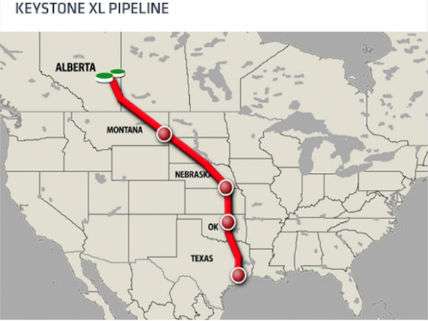Oil Sands Pipeline from Canada Is in U.S. National Interest
State Department reverses Obama ruling and permits construction of Keystone Pipeline.

After dithering for most of his term, President Barack Obama declared on November 6, 2015 that the construction of the Keystone Pipeline was not in the national interest. His declaration was just three weeks before the convening of the Paris climate change conference at which the universal climate agreement was adopted. In his statement, President Obama said:
…if we're going to prevent large parts of this Earth from becoming not only inhospitable but uninhabitable in our lifetimes, we're going to have to keep some fossil fuels in the ground rather than burn them and release more dangerous pollution into the sky.
To what extent would keeping crude from Canada's oilsands in the ground prevent man-made global warming? In 2012, climatologist Chip Knappenberger who works with the libertarian Cato Institute calculated that doing so would reduce the annual increase in global temperatures due to carbon emissions by "0.0001°C/yr, that is, one ten thousandths of a degree Celsius of temperature rise from the Canadian tar sands oil delivered by the Keystone XL pipeline each year."
The pipeline would transport 800,000 barrels per day from Canada's oilsands production fields to refineries on the U.S. Gulf Coast. Canada had llittle interest in keeping that oil in the ground, so Prime Minister Justin Trudeau approved last year the construction of another pipeline would transport the crude to Canada's west coast for export abroad. (Actually, only persistent low prices would keep that oil in the ground.)
Just days after taking office, President Donald Trump ordered the State Department to review the application asking for approval of the Keystone Pipeline and decide if its construction is in the national interest. The State Department will reportedly issue today the finding that it is and the relevant permit to cross an international boundary will be forthcoming.
So will construction proceed? Maybe not. First, getting oil out of oilsands is a costly endeavor and oil prices have declined substantially since the pipeline was proposed. Secondly, the pipeline faces implacable opposition from activists and landowners in Nebraska who will seek court orders to stop or slow construction.
Bloomberg News reports:
Sara Shor, a campaign manager for the climate advocacy group 350.org, vowed to "raise hell at the national level" and recruit millions of people to fight the project, including by highlighting their concerns during lawmakers' town halls during a planned congressional recess next month.
"We're going to continue to make Keystone XL a political issue and push every elected official to come out against this project if they care about communities, local rights, eminent domain, air, water and climate," Shor said by phone. "It just touches so many issues."
In other news, the Trump administration-approved Dakota Access Pipeline is supposed to begin transporting oil this weekend; that is, if it's not sabotaged.
Disclosure: Back in 2011, I took a junket to report on the Canadian oilsands that was sponsored by the American Petroleum Institute. My travel expenses to visit Alberta's oil sands were covered by the API. The API did not ask for nor did it have any editorial control over my reporting of that trip. For more background see my articles, The Man-Made Miracle of Oil from Sand and Conflict Oil or Canadian Oil?


Show Comments (36)